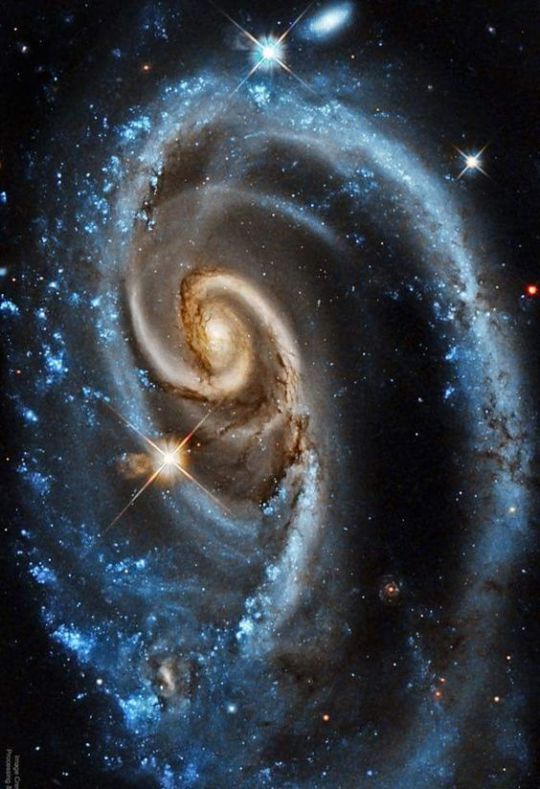#ugc 1810
Explore tagged Tumblr posts
Text

The Cosmic Rose, Arp 273: UGC 1810 (top) and UGC 1813 (bottom) // Pedro Sánchez
#astronomy#astrophotography#galaxy#spiral galaxy#barred spiral galaxy#interacting galaxies#peculiar galaxy#star-forming galaxy#cosmic rose#Arp 273#UGC 1810#UGC 1813#andromeda
64 notes
·
View notes
Photo

2025 June 1
UGC 1810: Wildly Interacting Galaxy from Hubble Image Credit: NASA, ESA, Hubble, HLA; Processing & Copyright: Domingo Pestana
Explanation: What's happening to this spiral galaxy? Although details remain uncertain, it surely has to do with an ongoing battle with its smaller galactic neighbor. The featured galaxy is labelled UGC 1810 by itself, but together with its collisional partner is known as Arp 273. The overall shape of UGC 1810 -- in particular its blue outer ring -- is likely a result of wild and violent gravitational interactions. This ring's blue color is caused by massive stars that are blue hot and have formed only in the past few million years. The inner galaxy appears older, redder, and threaded with cool filamentary dust. A few bright stars appear well in the foreground, unrelated to UGC 1810, while several galaxies are visible well in the background. Arp 273 lies about 300 million light years away toward the constellation of Andromeda. Quite likely, UGC 1810 will devour its galactic sidekick over the next billion years and settle into a classic spiral form.
∞ Source: apod.nasa.gov/apod/ap250601.html
119 notes
·
View notes
Text
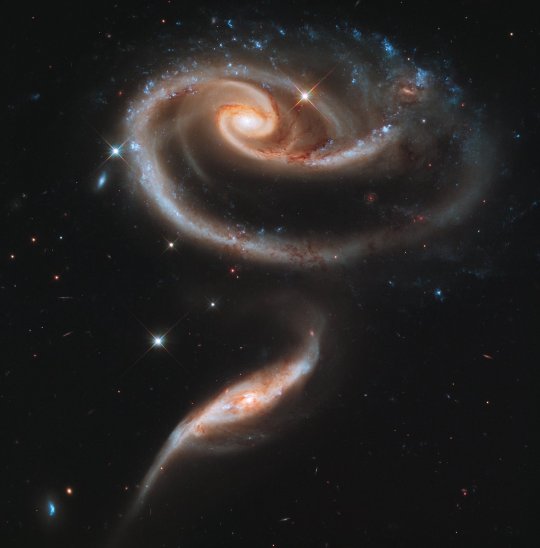
A rose made of galaxies
Arp 273 is a pair of interacting galaxies, 300 million light years away in the constellation Andromeda. It was first described in the Atlas of Peculiar Galaxies, compiled by Halton Arp in 1966. The larger of the spiral galaxies, known as UGC 1810, is about five times more massive than the smaller galaxy. It has a disc that is tidally distorted into a rose-like shape by the gravitational pull of the companion galaxy below it, known as UGC 1813. The smaller galaxy shows distinct signs of active star formation at its nucleus, and "it is thought that the smaller galaxy has actually passed through the larger one."
#rose#astronomy#astrophotography#astro community#science#photography#space#hubble telescope#astrophile#cosmos#astrophysics
509 notes
·
View notes
Text



This image of a pair of interacting galaxies called Arp 273 was released to celebrate the 21st anniversary of the launch of the NASA/ESA Hubble Space Telescope.
The larger of the spiral galaxies, known as UGC 1810, has a disk that is tidally distorted into a rose-like shape by the gravitational tidal pull of the companion galaxy below it, known as UGC 1813.
A swath of blue jewels across the top is the combined light from clusters of intensely bright and hot young blue stars. The distorted shape shows signs of tidal interactions with the smaller of the two. It is thought that the smaller galaxy has actually passed through the larger one.
#nasa#galaxy#galassia#universe#stars#astronomy#love#galaxies#science#scienza#astronomia#nasa photos#astro observations
100 notes
·
View notes
Text

ARP 273 and UGC 1810
300 million light years from Earth in the constellation of Andromeda lies the galaxy UGC 1810, but what is happening ?
The galaxy is undergoing merger with a smaller neighbour, but the gravitational interaction has created this huge blue ring, while leaving the inside of the galaxy less touched, and still the cream colour of older longer lived stars.
The blue is the result of new stars being born as a direct result of the smash up, such gravitational shocks cause dust and gas to bunch up along shock waves, and create some of the largest blue giant stars.
They live only a few million years before collapsing to neutron stars or black holes, all that will slowly fall towards the centre and one day increase the size of the supermassive black hole.
In the background you can see a few galaxies much further behind, as well as a few stars in our own galaxy in the way.
46 notes
·
View notes
Text
Astronomy Picture of the Day
2025 June 1
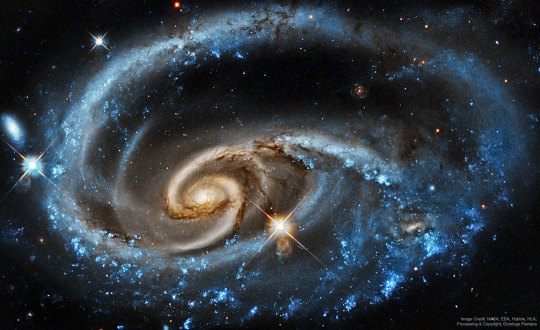
UGC 1810: Wildly Interacting Galaxy from Hubble
A bright galaxy with unusual blue spiral arms is shown against a dark starfield. The outer part of the spiral appears as a blue ring, while the inner part appears to have separate -- and more tan -- spiral structure.
Image Credit: NASA, ESA, Hubble, HLA; Processing & Copyright: Domingo Pestana
Explanation: What's happening to this spiral galaxy? Although details remain uncertain, it surely has to do with an ongoing battle with its smaller galactic neighbor. The featured galaxy is labelled UGC 1810 by itself, but together with its collisional partner is known as Arp 273. The overall shape of UGC 1810 -- in particular its blue outer ring -- is likely a result of wild and violent gravitational interactions. This ring's blue color is caused by massive stars that are blue hot and have formed only in the past few million years. The inner galaxy appears older, redder, and threaded with cool filamentary dust. A few bright stars appear well in the foreground, unrelated to UGC 1810, while several galaxies are visible well in the background. Arp 273 lies about 300 million light years away toward the constellation of Andromeda. Quite likely, UGC 1810 will devour its galactic sidekick over the next billion years and settle into a classic spiral form.
Authors & editors: Robert Nemiroff (MTU) & Jerry Bonnell (UMCP)
NASA Official: Amber Straughn
A service of: ASD at NASA / GSFC,
NASA Science Activation
& Michigan Tech. U.
4 notes
·
View notes
Text
NASAs Hubble Celebrates 21st Anniversary with Rose of Galaxies
To celebrate the 21st anniversary of the Hubble Space Telescope’s deployment into space, astronomers at the Space Telescope Science Institute in Baltimore, Md., pointed Hubble’s eye at an especially photogenic pair of interacting galaxies called Arp 273. The larger of the spiral galaxies, known as UGC 1810, has a disk that is distorted into a […] from NASA https://ift.tt/XP9yM7C
2 notes
·
View notes
Text
2.06.2025: Von NASA zum Astronomiebild des Tages gekürt
Ein von Domingo Pestana aus La Palma bearbeitetes Foto der Spiralgalaxie UGC 1810 Ein von Domingo Pestana aus La Palma bearbeitetes Foto der Spiralgalaxie UGC 1810 wurde an diesem Sonntag, dem 1. Juni, erneut von der NASA zum Astronomischen Bild des Tages (APOP) gekürt. UGC 1810: Intensiv interagierende Galaxie laut Hubble. Bildnachweis: NASA, ESA, Hubble, HLA. Bearbeitung und Urheberrecht:…
0 notes
Photo
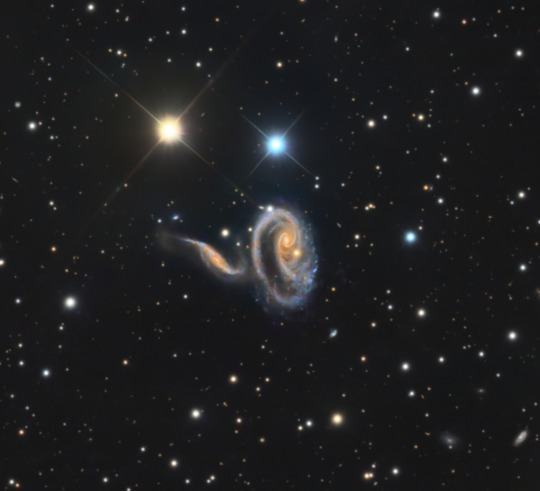
2025 January 9
Peculiar Galaxies of Arp 273 Image Credit & Copyright: Dave Doctor
Explanation: The colorful, spiky stars are in the foreground of this image taken with a small telescope on planet Earth. They lie well within our own Milky Way Galaxy. But the two eye-catching galaxies in the frame lie far beyond the Milky Way, at a distance of over 300 million light-years. The galaxies' twisted and distorted appearance is due to mutual gravitational tides as the pair engage in close encounters. Cataloged as Arp 273 (also as UGC 1810), these galaxies do look peculiar, but interacting galaxies are now understood to be common in the universe. Closer to home, the large spiral Andromeda Galaxy is known to be some 2 million light-years away and inexorably approaching the Milky Way. In fact the far away peculiar galaxies of Arp 273 may offer an analog of the far future encounter of Andromeda and Milky Way. Repeated galaxy encounters on a cosmic timescale ultimately result in a merger into a single galaxy of stars. From our perspective, the bright cores of the Arp 273 galaxies are separated by only a little over 100,000 light-years.
∞ Source: apod.nasa.gov/apod/ap250109.html
119 notes
·
View notes
Photo
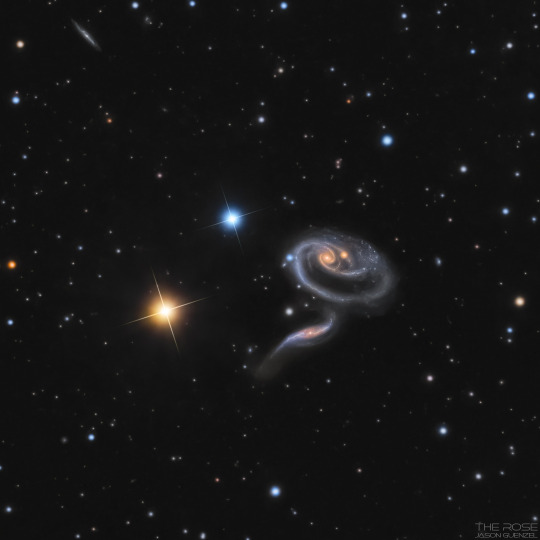
Peculiar Galaxies of Arp 273
2 notes
·
View notes
Photo
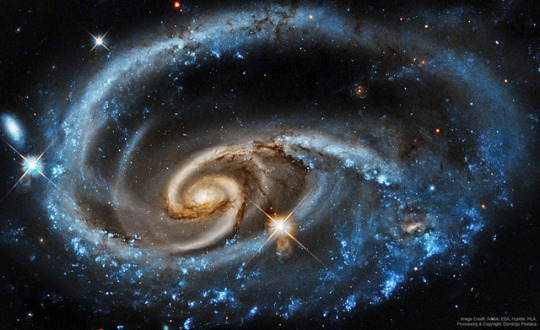
UGC 1810: Wildly Interacting Galaxy from Hubble
What's happening to this spiral galaxy? Although details remain uncertain, it surely has to do with an ongoing battle with its smaller galactic neighbor. The featured galaxy is labelled UGC 1810 by itself, but together with its collisional partner is known as Arp 273. The overall shape of the UGC 1810 -- in particular its blue outer ring -- is likely a result of wild and violent gravitational interactions. This ring's blue color is caused by massive stars that are blue hot and have formed only in the past few million years. The inner galaxy appears older, redder, and threaded with cool filamentary dust. A few bright stars appear well in the foreground, unrelated to UGC 1810, while several galaxies are visible well in the background. Arp 273 lies about 300 million light years away toward the constellation of Andromeda. Quite likely, UGC 1810 will devour its galactic sidekick over the next billion years and settle into a classic spiral form.
Credit: NASA, ESA, Hubble, HLA; Processing & Copyright: Domingo Pestana
294 notes
·
View notes
Text
Astronomy Picture of the Day
2025 January 9
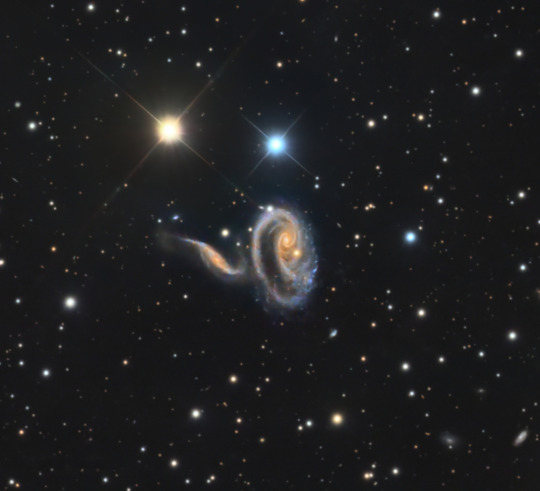
Peculiar Galaxies of Arp 273
Image Credit & Copyright: Dave Doctor
The colorful, spiky stars are in the foreground of this image taken with a small telescope on planet Earth. They lie well within our own Milky Way Galaxy. But the two eye-catching galaxies in the frame lie far beyond the Milky Way, at a distance of over 300 million light-years. The galaxies' twisted and distorted appearance is due to mutual gravitational tides as the pair engage in close encounters. Cataloged as Arp 273 (also as UGC 1810), these galaxies do look peculiar, but interacting galaxies are now understood to be common in the universe. Closer to home, the large spiral Andromeda Galaxy is known to be some 2 million light-years away and inexorably approaching the Milky Way. In fact the far away peculiar galaxies of Arp 273 may offer an analog of the far future encounter of Andromeda and Milky Way. Repeated galaxy encounters on a cosmic timescale ultimately result in a merger into a single galaxy of stars. From our perspective, the bright cores of the Arp 273 galaxies are separated by only a little over 100,000 light-years.
Authors & editors: Robert Nemiroff (MTU) & Jerry Bonnell (UMCP)
NASA Official: Amber Straughn
A service of: ASD at NASA / GSFC,
NASA Science Activation
& Michigan Tech. U.
10 notes
·
View notes
Photo


I actually did a thing today. I changed Connie’s hair to be her new hair design cause I love it. I still have work to do on the line-art but I thought I should share this with Tumblr.I MADE A PUN. AHAHAHHAHAHAHA.... Astronomy puns.... It’s a rose made of two galaxies.... //awkward laughter as I back off into the darkness off SU obsession
Copyrights of characters to Rebecca Sugar and Cartoon Network
Why is watch SU on yahoo linked to this???????????????
#steven universe#connie#stevonnie#connie maheswaran#su#lion#Arp 273#interacting galaxies#astronomy#galaxies#lars and the stars#UGC 1810#UGC 1813#cartoon network#rebecca sugar
7 notes
·
View notes

